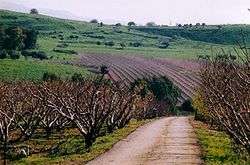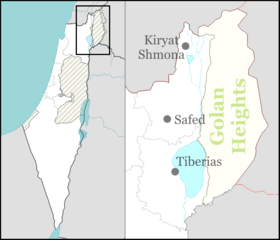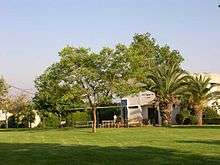Yuval
Yuval (Hebrew: יוּבַל), also known as Kfar Yuval (Hebrew: כְּפַר יוּבַל), is a moshav in northern Israel. Located in the Galilee Panhandle between Metula and Kiryat Shmona, it falls under the jurisdiction of Mevo'ot HaHermon Regional Council. In 2019 it had a population of 638.[1]
Yuval יוּבַל | |
|---|---|
| Hebrew transcription(s) | |
| • official | Kfar Yuval |
 | |
 Yuval | |
| Coordinates: 33°14′48.11″N 35°35′53.51″E | |
| Country | |
| District | Northern |
| Council | Mevo'ot HaHermon |
| Affiliation | Moshavim Movement |
| Founded | 1953 |
| Founded by | Jerusalemite refugees |
| Population (2019)[1] | 638 |
| Name meaning | Creek |

History
The moshav was founded in 1953 by evacuees from the Old City of Jerusalem who originally arrived from Kurdistan on land that had belonged to the depopulated Palestinian village of Abil al-Qamh.[2] It was named "Yuval" (creek) after the Jordan river's tributaries in the area and also referring to Jeremiah 17:8[3] ("sends out its roots by the creek"). In the early 1960s most of the founders abandoned the moshav, and it was repopulated by Indian Jewish immigrants from Kochi.[4]
The proximity of the moshav to the border of Israel with Lebanon has made it a target for terrorist attacks. In 1975 a group of terrorists infiltrated the moshav, took control of a residence, and killed three members of one family.[5][6]
The main economic branches of the moshav, as of June 2004, are a chicken coop and plantations of avocado, apples, and plums. In recent years the moshav has relied on tourism from Israelis, and it is one of the leading places for village-style hospitality in northern Israel.
Notable residents
- Yuval Segal (born 1971), actor and comedian
References
| Wikimedia Commons has media related to Yuval. |
- "Population in the Localities 2019" (XLS). Israel Central Bureau of Statistics. Retrieved 16 August 2020.
- Khalidi, Walid (1992). All That Remains: The Palestinian Villages Occupied and Depopulated by Israel in 1948. Washington D.C.: Institute for Palestine Studies. p. 429. ISBN 0-88728-224-5.
- Bitan, H. (1999). 1948-1998: Fifty Years of 'Hityashvut': Atlas of Names of Settlements in Israel. Jerusalem: Carta, p.27
- Reliving Cochin memories The Hindu, 14 October 2010
- Smith, Terence (15 June 1975). "Palestinian Raiders Hold Israeli Family, But Then Are Slain". The New York Times. Retrieved 16 September 2019.
- Terrorists Attack Israeli Villagers Herald-Journal, 16 June 1975